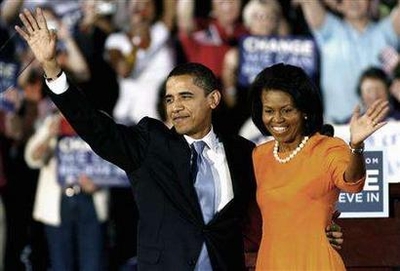Obama inching closer to presidential nomination
(Agencies)
Updated: 2008-05-07 23:51
Updated: 2008-05-07 23:51
WASHINGTON -- On the rebound, Barack Obama left Hillary Rodham Clinton with fast-dwindling chances to deny him the Democratic presidential nomination after beating her in North Carolina and falling just short in an Indiana cliffhanger.
 Democratic presidential candidate Senator Barack Obama and his wife Michelle wave to supporters at his North Carolina and Indiana primary election night rally in Raleigh, North Carolina, May 6, 2008. [Agencies] |
Obama was on track to climb within 200 delegates of attaining the prize, his campaign finally steadying after missteps fiercely exploited by the never-say-die Clinton.
His campaign dropped broad hints it was time for the 270 remaining unaligned party figures known as superdelegates to get off the fence and settle the nomination.
It was in that arena (even more than in the scattered primaries left) that the Democratic hyperdrama was bound to play out.
"You know, there are those who were saying that North Carolina would be a game-changer in this election," Obama told a roaring crowd in Raleigh, NC, on Tuesday night, referring to Clinton's hope that an upset there would recast the race in her favor.
"But today what North Carolina decided is that the only game that needs changing is the one in Washington, DC"
Clinton vowed to compete tenaciously for West Virginia next week and Kentucky and Oregon after that, and to press "full speed on to the White House."
But she risked running on fumes without an infusion of cash, and made a direct fundraising pitch from the stage in Indianapolis. "I need your help to continue our journey," she said.
And she pledged anew that she would support the Democratic nominee "no matter what happens," a vow also made by her competitor.
In an overnight e-mail appeal for donations, Obama said: "We have a clear path to victory."
But even as Obama took the day off Wednesday to be with his family in Chicago, Clinton showed no public signs of easing her pace. The campaign added a noon Wednesday appearance in Shepherdstown, W. Va., to her schedule. On Thursday, she planned to campaign in West Virginia, South Dakota and Oregon.
Polarizing, protracted and often bitter, the contest is hardening divisions in the party, according to exit polls from the two states.
A solid majority of each candidate's supporters said they would not be satisfied if the other candidate wins the nomination.
Fully one-third of Clinton's supporters in Indiana and North Carolina went beyond mere dissatisfaction to say they would vote for Republican John McCain instead of Obama if that's the choice in the fall.
Obama scored a convincing victory of about 14 points in North Carolina, where he'd been favored. Clinton squeezed out a narrow margin in Indiana after a long night of counting.
Racial divisions were stark.
In both states, Clinton won six in 10 white votes while Obama got nine in 10 black votes, exit polls indicated.
It was a slightly better performance than usual by Clinton among whites, while Obama's backing from blacks was one of his highest winning percentages yet with that group.
Against the backdrop of disunity, pressure is certain to intensify on the superdelegates to declare themselves and lasso Democrats together for the fall campaign against McCain. They are not bound by results in primaries or caucuses.
"There is an eagerness in the party to get this done and move on," said David Axelrod, chief Obama strategist. "There is no question that we can see the finish line."
|
||
|
||
|
||
|
|
|
|


